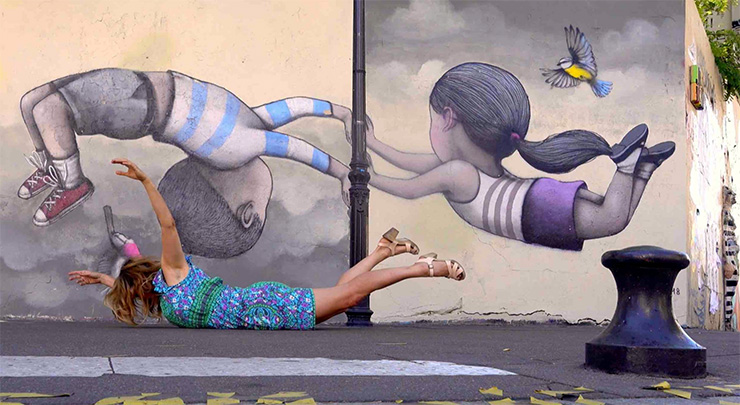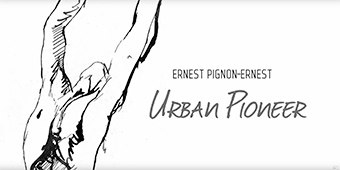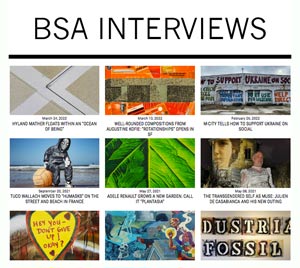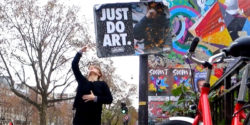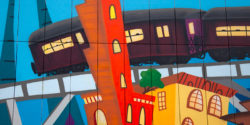Intermezzo: the midst of a roiling mass of interrelated actions, staccato storylines, rotating currents, complicating drama, and banal daily existence. At any moment your life can be this, or seventy-five variations of it.
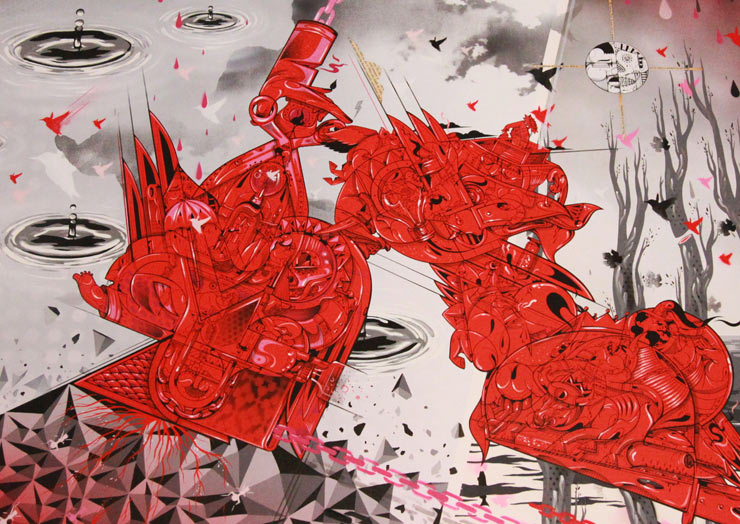
How & Nosm “Drought Portal” Detail. 40 x 30 (photo © Jaime Rojo)
How & Nosm regulated their daily existence for nearly seven months to create what may be the most challenging campaign of layered, collaborative, organized hot chaos that they ever have produced. Under the guidance of master print maker Jo Watanabe and his team at Pace Prints in Brooklyn, the graffiti writers turned their mural marksmen skills and their precise methods of art making inside out to create multiple, fluidly sharp monoprints that are each a painting of its own.
“I went to school myself!” exclaims Raoul of the rhythmic and rigorous schedule that required he and his twin brother Davide to show up to work on multiple pieces of multiple prints simultaneously five days a week from 9:30 to 5:30.
Davide describes the method, “You have a whole sheet of 75 different works, multiplied by however many different combinations and screens you can have – you have a black outline on this small section of an artwork, then magenta here, then we decide to spray a stencil on this portion, or fill this one – and in between you have to clean all these different screens. So in the end…”
We interject, “In the end, your head almost explodes.”
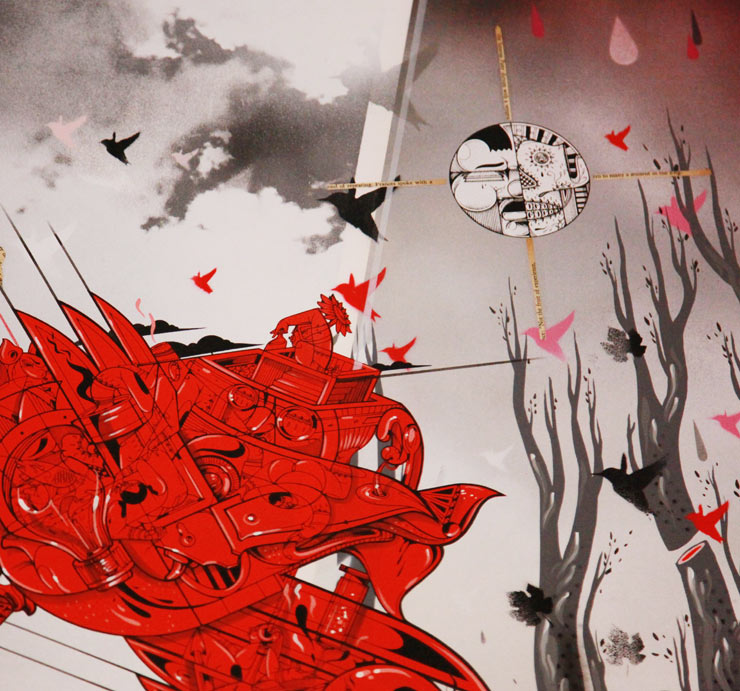
How & Nosm “Drought Portal” close up. (photo © Jaime Rojo)
“Well, at some point. Jo is very good at working systematically, because that’s how the Japanese work,” explains the rigidly methodical and razor sharp German who is never late to a meeting with us. He catches himself and laughs in baritone that reverberates, “Actually we work very well together, the Germans and the Japanese! It was awesome.”
Walking through the Pace print facility in Manhattan’s mid 20s it strikes you just how much of a step this is for the brothers to collaborate side by side and fully immersed with such a prestigious fine art print publisher that has been in business since 1968. Names like Chuck Close, Julian Schnabel, Ryan McGuinness, and Qin Feng randomly jump out at you from rack labels while you stroll past acres of contemporary art history in the grand and airy facility.
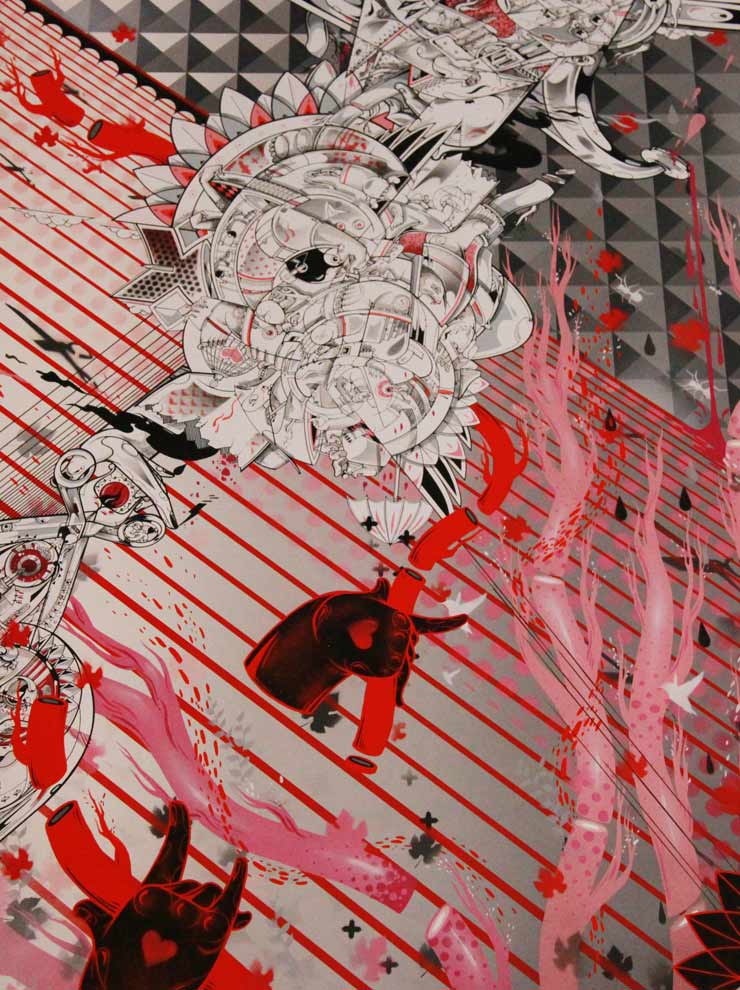
How & Nosm “Every All” Detail. 40 x 30 (photo © Jaime Rojo)
“We only took seven months to do ours,” says Raoul, “some of these prints, like one from Chuck Close I think, took two and a half years to complete,” he marvels. Only. This from one half of a mural team that knocks out mammoth 20’ x 30’ walls in their signature red, white and black palette with exacting detail in the same time that other artists take to sketch their outlines and block in the preliminary color.
As with their walls, the symbolic imagery calls to mind sequences in history, allusions to memories, sharp pangs of emotion; all layered and nested and swimming with one another without beginning or end. If it feels chaotic, it is by design, to drive away the dullness of the repetition that a typical print run and a typical life can produce.
“You have 25 to 30 screens and you gotta create something new every day,” says Raoul of the challenge to make each one unique. “But you get into a routine. It’s like everyday life. You wake up and have your routine, but you have to make it interesting to yourself every day. “
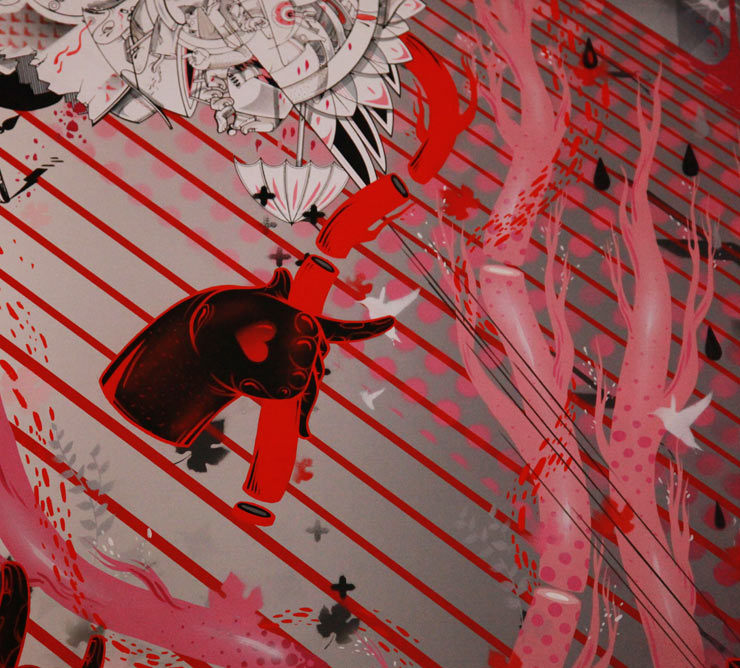
How & Nosm “Every All” close up. (photo © Jaime Rojo)
So the education of this experience has produced a riveting and color drenched array of polarities pulling and pushing across paper like few of their previous projects, and you can see that the results have enlivened their minds, sharpened their eyes. Additionally, How Nosm are proud that no computers were used in the project whatsoever.
“So that’s how we started,” says Raoul, “we painted on mylar, – it’s like a plastic,” he holds up the transparent sheet to show. “We used that to shoot the screens. We didn’t paint anything on the computer. Everything is hand painted; the layers – and they had so many machines and different ways of achieving effects, I didn’t know. “
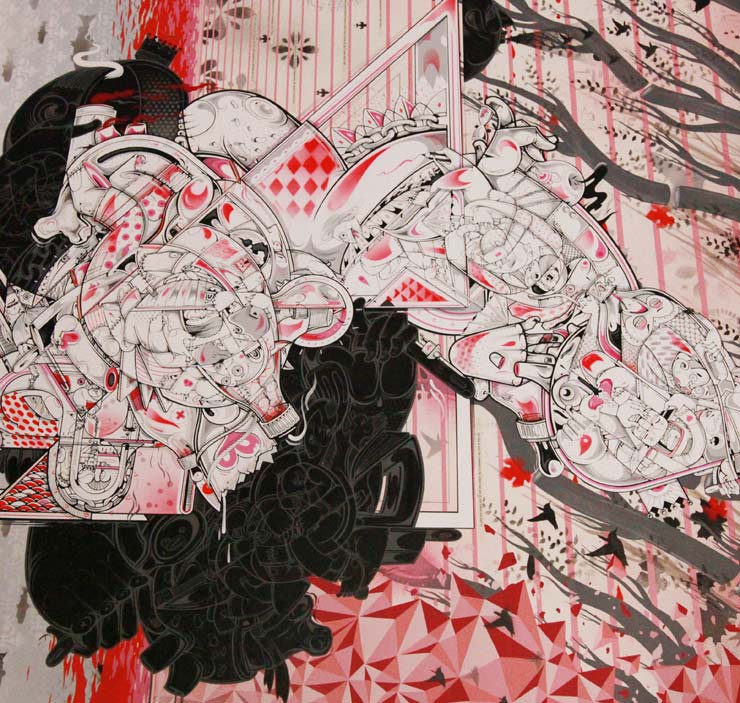
How & Nosm “Under my Thumb” Detail. 40 x 40 (photo © Jaime Rojo)
Did Mr. Watanabe and his team learn any new tricks from the grown up graffiti kids? “I mean we are like underdogs compared to who has done prints with them before,” says Davide. “We are the first ones with a hard core graff background. But they admitted that they really actually liked the work and they learned something from us too I think.”
We ask in what way – how the guys think about their work, their process? “Basically how spontaneous you can be with a spray can,” he says as he offers to let us feel the built up aerosol portion of one print that the brothers created with a simple stencil. “All this could have meant extra screens, but we saved them time, and they liked the effect.”
When the opening reception takes place this week at Pace and other new works from the series are unveiled simultaneously at the Armory show, How and Nosm are thinking that in the middle of it all will be some sort of graduation ceremony, at least figuratively. Suddenly everything they have done up until now has been redefined, refined even. In some way, they’ve done this before and in others it is all new.
What can follow this brief chapter in their storied creative career? Leave that for tomorrow. For now, behold. “They are all so unique, they all look so different,” says Raoul as he carefully pulls out one hand-embellished print after another from their elaborate archival wrappings.
“They are basically painting prints, you know?”
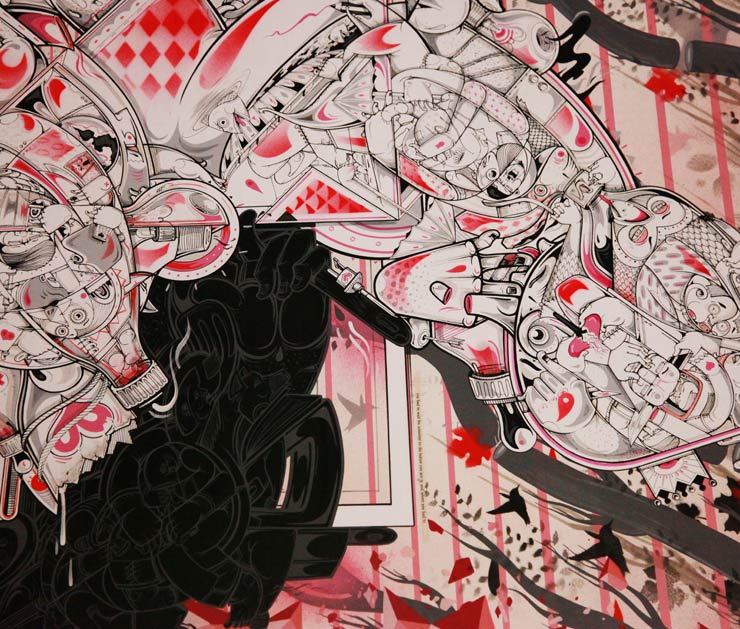
How & Nosm “Under my Thumb” close up. (photo © Jaime Rojo)

How & Nosm “Red Hot Summer” Detail. 40 x 40 (photo © Jaime Rojo)
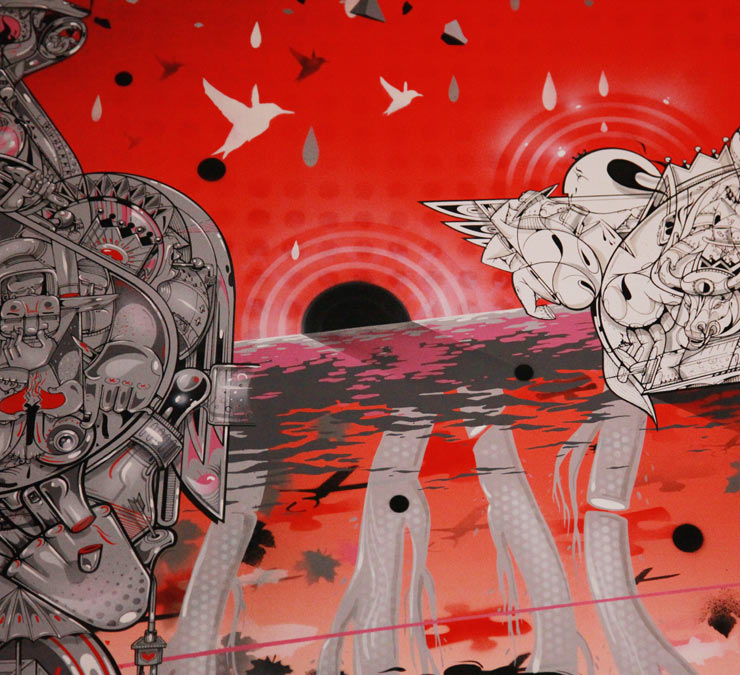
How & Nosm “Red Hot Summer” Detail. 40 x 40 (photo © Jaime Rojo)
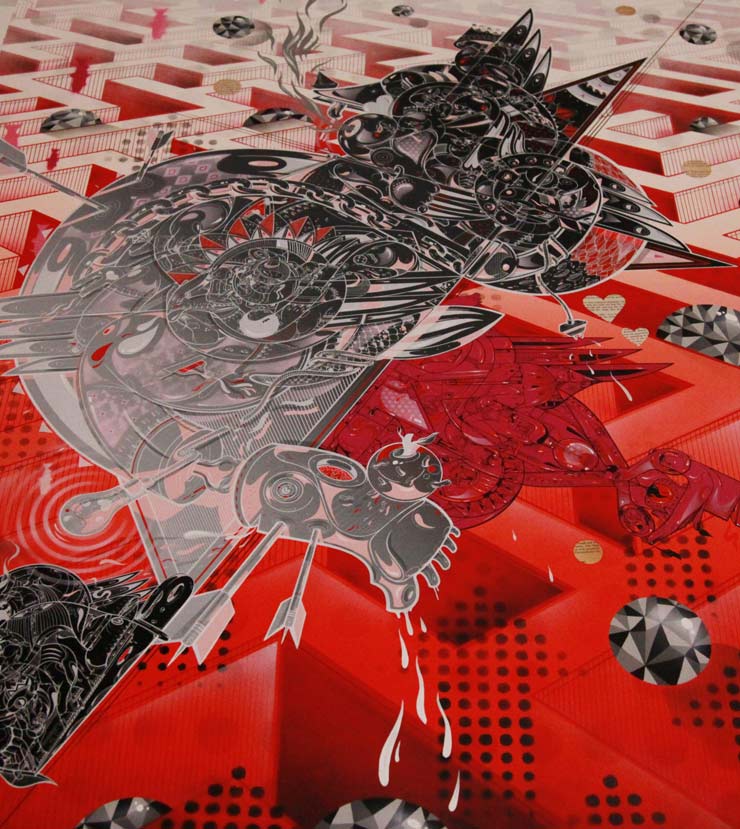
How & Nosm “Lost Fragments” Detail. 52 x 40 (photo © Jaime Rojo)
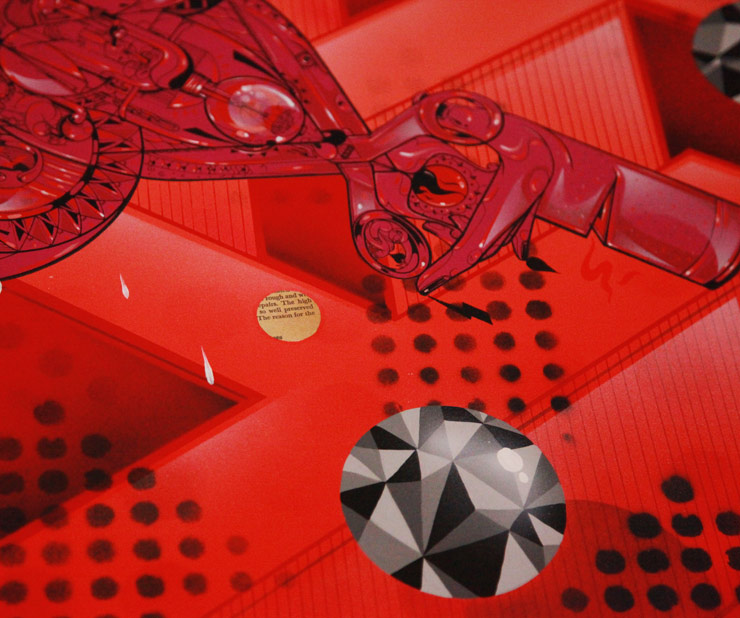
How & Nosm “Lost Fragments” Close Up (photo © Jaime Rojo)
How & Nosm “Way Things Are” Solo Exhibition at Pace Prints Opens this Thursday, March 6. Click HERE for details.
<<>>><><<>BSA<<>>><<<>><><BSA<<>>><><<>BSA<<>>><<<>><><BSA
Please note: All content including images and text are © BrooklynStreetArt.com, unless otherwise noted. We like sharing BSA content for non-commercial purposes as long as you credit the photographer(s) and BSA, include a link to the original article URL and do not remove the photographer’s name from the .jpg file. Otherwise, please refrain from re-posting. Thanks!
<<>>><><<>BSA<<>>><<<>><><BSA<<>>><><<>BSA<<>>><<<>><><BSA
This article is also published on The Huffington Post
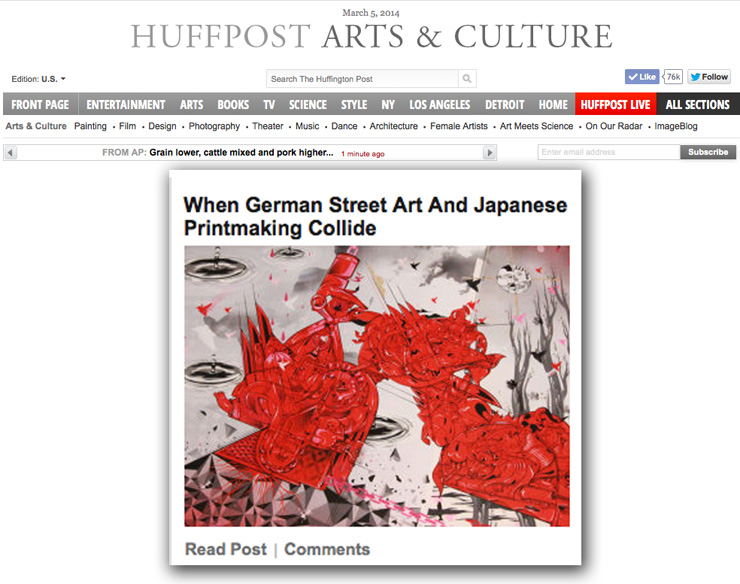
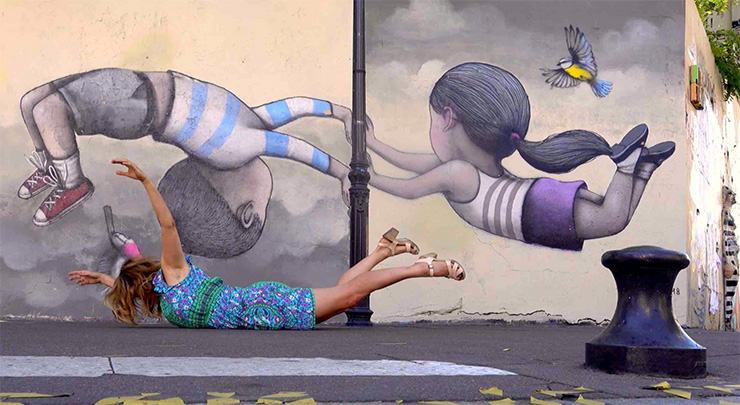
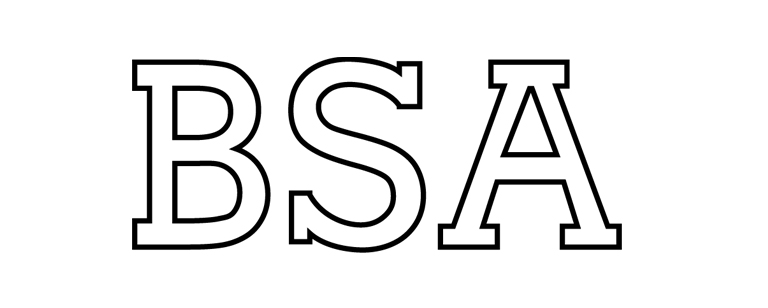 BROOKLYN STREET ART LOVES YOU MORE EVERY DAY
BROOKLYN STREET ART LOVES YOU MORE EVERY DAY